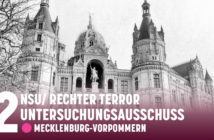May 31, 2013
The first four trial days in Munich of the NSU-Trial were initially dominated by a large number of lengthy preliminary motions filed by the lawyers of Beate Zschäpe and from Ralf Wohlleben. The end was however tangible: The reading of the charges and the notifications, and which defendants will speak on the matter.
The motions of the defense of Zschäpe and the defense of Wohlleben were not directly related to the “Heart of the criminal proceedings” (Co-Plaintiff representative Bliwier) – rather in terms of the deeds that the five defendants were accused of—it had to do with, at least partially, a delay in the proceedings. To claim a bias against the court, as the defense of Zschäpe and Wohlleben placed respectively on the first day of the trial is not unusual. It was surprising however that the proceeding Judge Manfred Götzl called a recess for the next two days of the trail in order to decide on the motion for bias—and therefore the Trail was adjourned until May 14th. Observers had, precisely because such motions are common, it was expected that the decision, on this stage, would go faster. For the present co-plaintiffs and the relatives of the victims, this shift meant renewed mental, financial, and organizational burdens.
Because of this, on the second day of the trial, May 14th, there were far fewer co-plaintiffs present then on May 6th. Also on this day initially it began with the motions of the defense and partially with worthless disputes about which party had the right to the floor particularly between Attorney Wolfgang Heer, (defender for Beate Zschäpe) and presiding Judge Götzl. Surprisingly at the end of the second day of the proceedings came the reading of the charges. It marked a turn in the proceedings, because finally after long discussions of both of the accreditation processes and after all the motions of the defense, it was no longer about technicalities, but rather, about the crimes of the NSU. State prosecutor Herbert Diemer gave the names of the victims and called out into the open the brutalities of the murderers.
The State Prosecution Sees Only an Isolated Cell
The application also shows that the image of the NSU held by the Office of the Attorney General will probably prevail through the course of the proceedings. While they went for it all when charging the accused, the most minimal solution was chosen when assessing the NSU complex and the discovery of its structure. The Federal Prosecutors here draw a picture of a largely isolated, closed cell with just a small supporters environment. With the death of Uwe Mundlos and Uwe Böhnhardt the terrorist group NSU had been resolved, in addition to the two dead simply Beate Zschäpe still belonged. The possibility that third parties may have been involved in the attacks, for instance such as scouting possible crime scenes, apparently the Attorney General did not consider a possibility. In terms of this there is no “actual evidence” (Statement of the Federal Prosecutor Diemer at the start of the process). Diemar, in a press conference after, played down the roll of the authorities and the intelligence services in the NSU-scene, instead he praised the internal security agency for their “good cooperation” in the current procedures. Per the review of the “failure” of the authorities were found incidentally responsible by the investigation committee.
It stands to be feared that the Attorney General will indeed go for the greatest possible conviction of the accused, but not the greatest possible explanation of the entire complex of the NSU. This is not a good sign considering the facts that the NSU Investigation Committee will be ending their work sometime soon and so, concerning the institutional workup of the NSU and their crimes, only the trial in Munich still remains. Therefore it is all the more important, that there is this process in addition to critical and publicly audible ancillary suits alongside independent and critical trial observation and accompanying investigation. May 14th began again with the processing of motions. Nicole Schneiders, defense attorney for Ralf Wohlleben, boldly made a motion on the third trial day to request the case be dismissed against their client, where the trip will go for Wohllebens defense. Who until his arrest was an active Neo-Nazi, and his Right-Wing Extreme Scene lawyers Schneiders and Klemke apparently rely on a political litigation and do not shy away from themselves yet the memory of the victims of the series of murders pulled dragged through them mud as “prejudice.”
The Separation of the Keupstraße Attacks Again from the Table
There was some surprise at the end of the third day the public announcement that Judge Götzl was considering separating the events of the nail bomb attack in Cologne in 2004 from the rest of the proceedings. The reason for this possibility was the fear that still more additional co-plaintiffs could come from this event, and the hall would be too small. Actually the issues of space did not arise because it is no longer expected that even more co-plaintiffs will come. In addition, a separation would be objectively and politically incorrect. The attack in Cologne’s Keupstraße stands as dozens of attempted murders as the racially motivated and as the act of propaganda at the center of the crimes of the NSU. A separation would also contribute to the termination of the trial in the same complex: “Should Beate Zschäpe be sentenced to life in the main trial with out the attack, it would be possible, the proceedings in reference to the attack in the Keupstraße after the code of criminal proceedings…be discontinued, the conviction for the bombing would not hold substantial weight,” said several representatives of the co-plaintiffs in a press release. The victims of the attach would therefore, said the co-plaintiff representative Alexander Hoffmann, would again be made second class citizens “and therefore it helps the NSU in hindsight to be a success.”
In order to calm everyone Götzl announced in the forth day of the trial, May 16 that a separation of the crimes was not currently planned. At the end of the day the defendants were asked if they would take the stand. There weren’t any surprises. Beate Zschäpe, André E. and Ralf Wohlleben will not comment. The defense of Wohlleben will however offer a statement from the defense. The accused Holger G. and Carsten S. will speak. Carsten S. will also answer questions. His statement is expected next week on June 4th.


